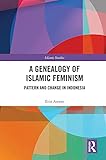A Genealogy of Islamic Feminism : Pattern and Change in Indonesia.
Material type: TextSeries: Routledge Islamic Studies SeriesPublisher: London : Taylor and Francis, 2018Edition: First editionDescription: 1 online resourceContent type: text Media type: computer Carrier type: online resourceISBN: 9781315193090; 9781351757034Subject(s): Islam - Religion | Religion, Gender and Sexuality | South East Asian StudiesAdditional physical formats: Print version: : No titleOnline resources: Click here to view.
TextSeries: Routledge Islamic Studies SeriesPublisher: London : Taylor and Francis, 2018Edition: First editionDescription: 1 online resourceContent type: text Media type: computer Carrier type: online resourceISBN: 9781315193090; 9781351757034Subject(s): Islam - Religion | Religion, Gender and Sexuality | South East Asian StudiesAdditional physical formats: Print version: : No titleOnline resources: Click here to view. chapter Introduction / Etin Anwar -- chapter 1 The making of the emancipation era -- A stepping-stone toward gender equality / Etin Anwar -- chapter 2 The association era and the politics of emancipation / Etin Anwar -- chapter 3 Gender politics in the era of development -- The making of state and feminist equality / Etin Anwar -- chapter 4 Engendering equality in the integration era -- The making of Islam as ethical framework for emancipation / Etin Anwar -- chapter 5 The proliferation era and the discursive patterns of Islamic feminism / Etin Anwar -- chapter Conclusion / Etin Anwar.
"A Genealogy of Islamic Feminism offers a new insight on the changing relationship between Islam and feminism from the colonial era in the 1900s to the early 1990s in Indonesia.The book juxtaposes both colonial and postcolonial sites to show the changes and the patterns of the encounters between Islam and feminism within the global and local nexus. Global forces include Dutch colonialism, developmentalism, transnational feminism, and the United Nations' institutional bodies and their conferences. Local factors are comprised of women's movements, adat (customs), nationalism, the politics underlying the imposition of Pancasila ideology and maternal virtues, and variations of Islamic revivalism. Using a genealogical approach, the book examines the multifaceted encounters between Islam and feminism and attempts to rediscover egalitarianism in the Islamic tradition--a concept which has been subjugated by hierarchical gender systems. The book also systematizes Muslim women's encounters with Islam and feminism into five phases: emancipation, association, development, integration, and proliferation eras. Each era discusses the confluence of global and local factors which shape the changing relationship between Islam and feminism and the way in which the discursive narrative of equality is debated and contextualized, progressing from biological determinism (kodrat) to the ethico-spiritual argument. Islamic feminism contributes to the rediscovery of Islam as the source of progress, the centering of women's agency through spiritual equality, and the reworking of the private and public spheres. This book will appeal to anyone with interest in international women's movements, interdisciplinary studies, cultural studies, women's studies, post-colonial studies, Islamic studies, and Asian studies. "--Provided by publisher.

